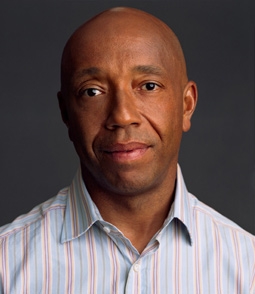
My interview with hip hop pioneer turned corporate mogul and spiritual aspirant, Russell Simmons, left much of what he told me still shooting around my mind weeks after we spoke. His statements regarding everything from equal rights to spiritual and social laws resonated with me. Simmons’ commitment to a “non-harming” lifestyle and his conviction in “trying to find a piece of God in each person,” and all living beings for that matter, continue to echo. When Russell Simmons speaks it is more than idle chatter. His philosophical outlook is a gift he shares with the hope of leaving a lasting impression on the recipient.
As for Simmons himself, he attests to experiencing his fair share of growing pains on his journey from Queens-bred street kid to Manhattan sophisticate and uber-humanitarian. Our conversation was full of surprising discoveries about a man that millions recognize but few truly know.
A devoted yoga practitioner and strict vegan, Russell Simmons asserts that he guides his life with the art of giving, which may seem ironic to some of his fan base since he has amassed so much material wealth and every creature comfort one could hope for. As he recently told Extra, “The more you give, the more you get.” It is that mantra that concisely sums up his new book, Super Rich: A Guide To Having It All. And buyer beware, Super Rich is a living guide for giving; it explains and praises the universal laws for happiness and spiritual evolution as a path to success in all areas of life, including material accumulation which Simmons sees as a bi-product of living well.
Friend and fan Deepak Chopra attests that “Simmons defines true affluence as a higher state of consciousness.” I, myself, have always defined wealth as freedom. How do you define it? Perhaps your definition could use some refining or redirection. Either way, it is certainly a topic worth exploring as Russell Simmons does quite eloquently in Super Rich.
Purveyor of hip hop and urban culture, businessman, philanthropist… from where I stand Russell Simmons’ most impressive asset is his apparent ability to have transcended not only some of the original values he learned on the urban streets as a young man, but the shallow gluttony that often plagues the nouveau riche. Russell Simmons has a sixth sense for recognizing potential dead ends and averting them brilliantly.
What began as a discussion about his numerous business enterprises gradually re-shaped to accommodate Simmons’ ambitious desire for universal human transformation.
PR.com (Allison Kugel): There are so many young people who look up to you. Who do you look up to?
Russell Simmons: All of them and everybody around me. I try to learn from everybody. I try to find a piece of God in each person, so it changes by who is in front of me. I’m looking at somebody and I’m thinking about all of the great things they contribute and then they become my mentor for that moment.
PR.com: So it can be someone who is younger, older, it doesn’t matter…
Russell Simmons: No.
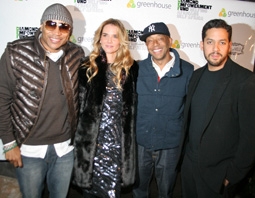
PR.com: When you look at the way hip hop music and culture has exploded since the 1980s when you co-founded Def Jam, and all of the artists who have become mainstream, do you take some credit for that, or do you feel that it would have come about one way or another?
Russell Simmons: Of course it would have come about by itself, it had already come along. I feel like I just happened to be in the right place at the right time.
PR.com: How did you recognize that you were in the right place at the right time?
Russell Simmons: I loved it and I had passion for it. That’s what I recognized, that I loved doing it.
PR.com: Which rap artist do you feel is the greatest poet of all time?
Russell Simmons: It changes daily. Jay-Z, when I’m listening to him on the radio or Chuck D when I’m listening to him on the radio, it changes.
PR.com: What do you think hip hop culture, in general, has done for young urban males?
Russell Simmons: It’s given a voice to a lot of people who are locked out of society and it has expressed the frustration, anger, and even sometimes inspiration, from voices of people who come from places that would [otherwise] not be heard.
PR.com: What are your thoughts on some of the rougher lyrics that continue to tear down the young urban female rather than building her up?
Russell Simmons: Ugh! What are my thoughts about the preacher who won’t let the woman in the pulpit or the firemen who are just completely sexist, and their kids hear it all day and it rubs off on them, or the previous generation’s sexism? My thoughts about sexism, in general is that it’s horrible. My feeling about women’s rights is that they should have equal rights, and they just got equal pay yesterday from the President. Abuse of women and a lack of [female] input in society today is why we have the wars and the abuse of animals and the abuse of each other that we have. Women’s input, and not women who take on this hardened element, but the female side of the brain and the female physical being is being separated from the decision making process, and it is the reason that the Earth is spinning off its axis. Or, actually, the people will spin off the Earth’s axis. The Earth itself will keep spinning, but people won’t even be here if women aren’t given a greater hold over the social process. They will make choices that really embody compassion and love in the way that they are able to give it.
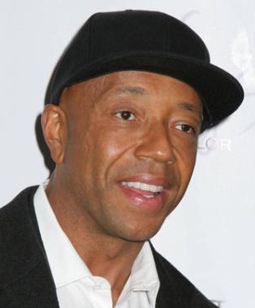
PR.com: I have posed that question to many different people in your industry and have never gotten an answer like that before. What I usually get is a defensive answer.
Russell Simmons: Women are abused. Women have been locked out of everything throughout history, and even in religion. Religion has undermined women.
PR.com: I always felt good about myself and never felt I was anything less than equal, but after I gave birth I felt like a force to be reckoned with.
Russell Simmons: Yeah, but you are still less than equal, believe me. Just like black people still are. They are all poor, aren’t they? Aren’t black people still poor all over the world?
PR.com: You’re certainly not poor.
Russell Simmons: Black people, the collective, not me. A woman might [someday] be President and Hillary Clinton is Secretary of State and there was never a chance that she wouldn’t be the same price as a man (referring to her salary), but women in general, black people in general, all over the world are poor. Women all over the world are less than human and less than equal. Even in religion they’ve been…
PR.com: Under the thumb of men.
Russell Simmons: That’s a good way of putting it, yeah. But women in hip hop, they speak out about it much more than women in other forms of cultural phenomenon; they really do speak out. They talk about being equal and better than equal in a way that is very convincing.
PR.com: Do you see the heavy commercialization and corporatization of hip hop culture and rap music as a success, or as a failure and a watering down of what it was originally intended to be?
Russell Simmons: The artists haven’t watered down their messages. The fact that corporations have jumped on and hip hop has become, instead of a fringe cultural element, a major mainstream cultural element is good because the voices are still coming from poor people who are still expressing things that would not be expressed without this poetry. And this is why I wrote my book.
PR.com: Describe the theme of your new book, Super Rich (release date, January 4, 2011, Gotham Books).
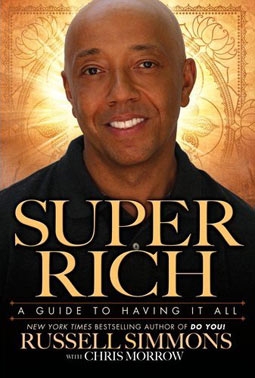
Russell Simmons: It’s about consciousness and about not only the influence of hip hop, but the influence of basic truths that sit inside you that hip hop artists and poets… they bring it out. They tell the truth.
PR.com: I want to ask you about your spiritual and religious beliefs and practices, because this book is extremely spiritual at its foundation…
Russell Simmons: I religiously meditate but I am not a religious person.
PR.com: Are you a practicing Buddhist?
Russell Simmons: No, I’m a yogi. Yoga scripture was written long before there was ever Buddhist scripture, or before there was the Bible or Koran or a Torah. Yoga sutras are science for happiness. My religion is compassion. Yoga sutras are a science that I practice daily, and religiously. Classic yoga has eight steps and there are social laws. The first steps are the Damas and they are like social laws, they are like the Ten Commandments and they were written and past on years before [religion]. Science of yoga, science for happiness is the same basis that exists in all scripture written before most modern-day religious practices. And it mirrors what is in all religion. I do wear Buddha images, but the Buddha scripture is mostly taken from the yoga sutras.
PR.com: When you pray, who do you pray to, or what do you pray to?
Russell Simmons: I pray to Atman, to the self. The Atman is self. If God were the ocean, you would be a piece of the God. In other words, you would be connected to the animals, to the planet and to everybody. When you practice compassion, you practice compassion to all of these things because all of these things are you, and you are them. That is a way that some yogis, Christian yogis, would view it; Christian yogis like Paramahansa Yogananda who believed in Christ as a miracle worker, but also believed in all of the prophets.
PR.com: How did you become a vegan and what initially made you get into the practice of yoga?
Russell Simmons: Because of the first step in yoga, Ahimsa, non-harming. The greatest cause of human karma is abuse of the ten billion farm animals that exists at all times. And then also the greatest cause of global warming, [meat] and dairy uses more oil than anybody but the army. You go to war over meat because it is the second largest use of oil. It also drains our resources, like our water, more than anything.
PR.com: But you weren’t raised this way. You discovered this information and this way of living as an adult…
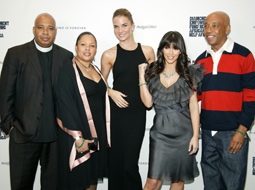
Russell Simmons: Yeah, well the idea that the greatest cause of global warming in the world is animal farming, and the animal abuse, it is right there in the U.N. report from the cover of the New York Times. But it’s not something people want to acknowledge. We know that the raising of these animals for food is twice as harmful to the environment as all the forms of transportation put together. We know that. That is common sense, but it is not passed around. And also, it makes you sick. Dairy and meat makes you sick.
PR.com: What motivated you to go in search of something that is so different from what you were taught growing up?
Russell Simmons: I went to yoga because there were so many hot girls there and I started listening to the teaching. From there, everybody was vegan and they started talking about it. It was for compassionate reasons that I stopped eating animals, but soon enough you are surrounded by a bunch of vegans and nutritionists, and then you are surrounded by all of these likeminded people. In the science of yoga and in many scripture they talk a lot about the chakras, and you’ve taken care of the first chakra, the Muladhara chakra, so that you can take care of and serve the rest of the planet. People who are compassionate realize that they have to serve themselves in order to serve the world. So it becomes a nutrition thing as well as a compassion thing.
PR.com: What is your take on the social dilemma that a lot of minorities face where they want to stay connected to their cultural roots, their neighborhood and their old friends, yet they want more than what their parents or their grandparents had?
Russell Simmons: I think that each individual has to rise up and take advantage of what is in front of them, and there is a lot that’s in front of them. There’s a lot of opportunity in front of them as individuals and they don’t have to carry the weight of their parents. If you’re talking about African American people, I think that they are the last of all the cultures in all of the American communities to integrate. They fought for integration and I think that they should be comfortable with it. It doesn’t mean you don’t support your community. It means that you have to be a part of the mainstream and recognize all of your opportunity, and since the culture is so big in popular culture you should also be able to exploit it to everyone, and not just to black people.
PR.com: Tell me about a time when you failed at something, what you learned from it, and how you used it to make you better.
Russell Simmons: That was with 360HipHop, but now GlobalGrind is on fire. 360 was a site right at the beginning of the Internet revolution. It was about timing and it was just too early. There were no advertisers, and nobody had broadband.
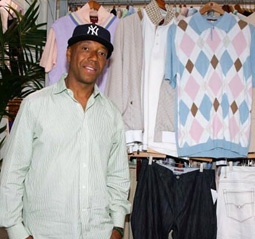
PR.com: I recently watched an episode of your show, Running Russell Simmons (Oxygen Network). What is this business about you having to approve your dates’ wardrobes before you take her to an event?
Russell Simmons: You know what? I didn’t approve Flaviana [Matata]. We have showrooms with all the designers calling us and asking us if we need anything. And with Heidi, Heidi is one of the best dressed people in the world. Her best friend is Rachel Roy, so she is always wearing Rachel Roy which is fantastic! I said, “See if she wants something else.” Then they made it seem like… I think it’s something where you have to watch what the network does (Russell seems dismayed with how this particular episode portrays him). With Heidi, I said, “What do you need? Do you want Zac Posen or somebody else to send you some dresses?” That’s what it was about. She’s always wearing Rachel Roy, and I love Rachel Roy, but she always wears the same designer because it’s her best friend. And Heidi can out-dress everybody. That’s why I loved her answer, “I always look hot! What’chu talking about?!” (Imitating his date) And the thing with Flaviana, she just came [here] from Tanzania and she doesn’t have access to everything. Can’t nobody approve these girls’ clothes, they out-dress everybody.
PR.com: Well, you have to watch your producers because they’re sneaky with their editing.
Russell Simmons: Exactly. Believe me, we’ve had these fights in every situation and I can’t win every one of them. Some of them slip by me.
PR.com: What was your evolution as a designer, going from the Phat Farm label to Argyle Culture?
Russell Simmons: It was honest. For the last four or five years with Phat Farm I had trouble designing clothes that fit into the department where I was shipping, the young men’s department. Now I’m designing for the men’s department and I am having a lot more fun and it is more honest. It’s honest evolution and honest distribution. I’m a man, I make men’s clothes. Adam Sandler grew up on Phat Farm and he is still wearing it, and I’m sending him Argyle Culture. The President grew up on Phat Farm and he is now wearing Polo like every other man who grew up on Phat Farm. It is something that didn’t really represent his generation, and we are trying now to serve this urban graduate.
PR.com: What I got from the Argyle Culture line, and I could be going too deep, but what I got from it is that it speaks to more opportunities, more education and more self esteem, hence a more sophisticated look.
Russell Simmons: All of that can come from it, but the truth is that it speaks to more maturity and, yes, it does have to do with more success.
PR.com: And more opportunities in the 21st century.
Russell Simmons: People who had their pants hanging off their ass, now suddenly they’re joining the mainstream.
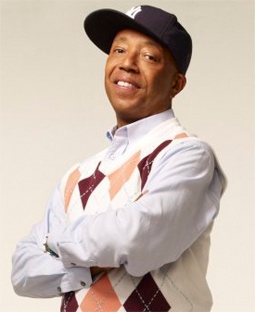
PR.com: (Laughs.) It’s really amazing that the political landscape trickles down to everything from our films, music, fashion and so many other things. The fact that President Obama is in office, I feel that might have unconsciously had an effect on where you wanted to take your product line.
Russell Simmons: All things lead to the next generation and what hip hop graduates are, urban graduates I call them.
PR.com: How are men embracing this new clothing line?
Russell Simmons: It’s selling very well. All of the small sizes are sold out. I think that some of the buyers thought it was all the same audience and that they were all bigger sizes and hip hop [style], and they found out that it was not a “black line,” and not oversized. They found that all of the sizes that people wanted sold out the minute it hit the store and they can buy it correctly just like they buy Lacoste or any other men’s line. (Argyle Culture is available at Macy’s).
PR.com: The pants hanging off the ass was kind of a “f*ck you” to a society that was un- accepting and exclusionary, and now this new way of dressing speaks to a feeling of, “I can be a part of the mainstream and succeed.”
Russell Simmons: Very good. I wish I had said that.
Russell Simmons’ book “Super Rich: A Guide To Having It All” is available January 4, 2011 at bookstores and on Amazon.com (Gotham Books).
Argyle Culture is available at Macy’s. Check ArgyleCulture.com for store locations.
